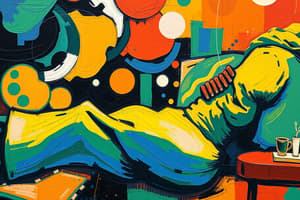Podcast
Questions and Answers
When does James Gatz change his name and why?
When does James Gatz change his name and why?
Gatsby was 17 years old and changed his name to sound more glamorous and pursue a better, richer life.
What is Daisy's real response to the party, according to Nick?
What is Daisy's real response to the party, according to Nick?
Daisy does not like the party because the attendees were drunk and unsophisticated.
What does Gatsby tell Nick he wants Daisy to do?
What does Gatsby tell Nick he wants Daisy to do?
Gatsby wants Daisy to understand that he loves her and to leave Tom.
What does Nick mean when he says that 'Jay Gatsby sprang from his Platonic conception of himself'?
What does Nick mean when he says that 'Jay Gatsby sprang from his Platonic conception of himself'?
How is the comparison of Gatsby with Christ ironic?
How is the comparison of Gatsby with Christ ironic?
What does Gatsby's response to the dinner invitation reveal about his social sensitivity?
What does Gatsby's response to the dinner invitation reveal about his social sensitivity?
What is Gatsby's view of the past?
What is Gatsby's view of the past?
What is Gatsby giving up when he kisses Daisy?
What is Gatsby giving up when he kisses Daisy?
Study Notes
Gatsby's Name Change
- James Gatz changes his name to Jay Gatsby at 17 to pursue a more glamorous and wealthy life.
- The name change symbolizes his desire to reinvent himself and his aspirations for a better future.
- The first use of the name occurs while rowing to Dan Cody's yacht.
Daisy's Reaction to the Party
- Daisy feels discomfort at Gatsby's party due to the unsophisticated and drunken guests, which starkly contrasts her social milieu.
- She is offended because the party lacks the emotional depth and gesture she expects.
- The atmosphere is marked by loud singing and dancing, contributing to her distaste.
Gatsby's Intentions for Daisy
- Gatsby wishes for Daisy to recognize his love and leave Tom for him.
- He desires a fresh start, where the past five years are forgotten, and they can renew their relationship.
Nick's Interpretation of Gatsby
- Gatsby embodies an idealized self-image, modeled on a Platonic conception of his identity.
- This suggests that Gatsby's perception of himself is based on lofty ideals rather than reality.
Irony of Gatsby and Christ Comparison
- The comparison highlights the irony that, unlike Jesus, Gatsby is unaware of his responsibilities and moral direction.
- Gatsby has distanced himself from his father and his past, indicating a lack of true spiritual awareness.
- If the Christ comparison persists, Gatsby's fate may foreshadow a tragic downfall or sacrifice.
Gatsby's Social Sensitivity
- Gatsby displays social naivety during a dinner invitation, failing to read the disingenuous intentions of Tom and Mr. Sloane.
- This scene underscores his obsessive desire to reconnect with Daisy, driving his actions even in socially uncomfortable scenarios.
- Gatsby's obsession with Daisy clouds his judgment about social interactions.
Gatsby's View on the Past
- Gatsby idealizes the past, wishing to erase the changes and obstacles that have arisen since his last time with Daisy.
- Nick argues that the past cannot be reclaimed, contrasting Gatsby’s unrealistic belief that he can recreate a perfect previous relationship.
- The notion that money cannot resolve emotional complexities is emphasized.
Significance of the Kiss
- The kiss symbolizes Gatsby's surrender of his identity and dreams in favor of an idealized version of love.
- After the kiss, Gatsby sacrifices his extraordinary imagination for the sake of pursuing Daisy, revealing the tragic nature of his obsession.
- It reflects the dichotomy between dreams and reality, emphasizing that Daisy may only exist in Gatsby's memories.
Studying That Suits You
Use AI to generate personalized quizzes and flashcards to suit your learning preferences.
Description
Test your knowledge on Chapter 6 of The Great Gatsby with this set of flashcards. Explore key moments, character insights, and themes as you dive into the narrative. Perfect for reviewing before discussions or exams!



